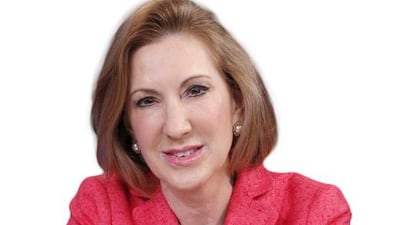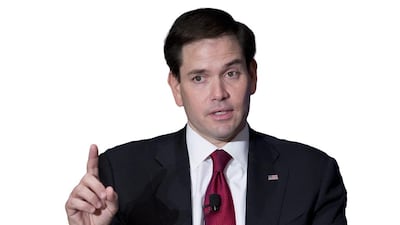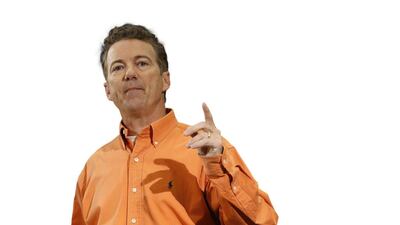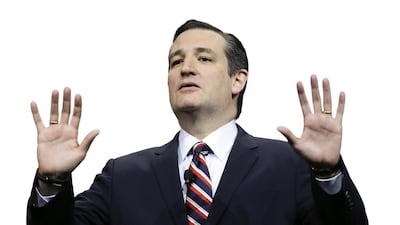Everybody wants to be the Gipper. Every 2016 Republican presidential candidate, be they Ted Cruz or Chris Christie, sees himself as the inheritor of Ronald Reagan’s mantle.
Reagan’s appeal, for many of the Republican presidential contenders as well as the voters they seek to woo, is his stubborn steadfastness. Reagan, in their estimation, never changed, never tailored his beliefs for an electorate. He simply waited until the country was ready for him, a “citizen-politician” who saved the country from economic and political ruin and then slipped off, content in the satisfaction of a job well done.
It is easy to imagine how nearly every presidential contender, from Marco Rubio to Jeb Bush to Chris Christie to Mike Huckabee, looks in the mirror and sees a 21st-century Reagan staring back at him. (The fantasy appears to be less appealing to female candidates.) He is the Reagan of economic stimulus through tax cuts and muscular Christian values and "Mr Gorbachev, tear down this wall". Just in time for what is shaping up to be a wide-open competition for the Republican presidential nomination, and possibly for the presidency as well, a new slate of books has emerged on Reagan's life and legacy, offering guidance, along with a note of caution, to those politicians looking to fill his shoes. Both H W Brands's sprawling new biography Reagan: The Life and Reagan's Legacy in a World Transformed, edited by Jeffrey L Chidester and Paul Kengor, seek some academic and intellectual heft to serve as ballast for all the Reaganite fanboys. Brands, a professor at the University of Texas and the author of a well-regarded biography of Franklin Roosevelt, argues that Reagan was to the second half of the American 20th century what Roosevelt was to the first: "The key to Reagan's success, like that to Roosevelt's, was his ability to restore Americans' faith in their country." Having rifled through a few thousand pages of encomia to Reagan, with some stray critiques drizzled in for seasoning, what advice can we offer the Rand Pauls and Scott Walkers of the world from the life of the real – and not the plaster-cast – Ronald Reagan?
Perhaps the prime lesson of Reagan’s meteoric rise, electorally speaking, is that it is never too soon. Reagan was an underemployed, ageing actor, his days of movie stardom more than a decade behind him, when he was approached by Barry Goldwater’s floundering 1964 presidential campaign with a proposal. Would the telegenic TV star, who had made a living delivering speeches for General Electric, give a televised speech for the candidate? The resulting speech hardly mentioned Goldwater, but it made Reagan an overnight political star. Almost instantly, Reagan was feted as a potential candidate for the governorship of California. Within two weeks of winning the governor’s seat, in 1966, Reagan was conducting meetings with advisers about his path to the presidency – in 1968. It ultimately took 14 more years to win a presidential election, but Reagan wasted no time in starting the fight. Republicans have spent six years carping about the perils of the underqualified Obama. (Before that, liberals spent eight harrumphing about the underqualified George W Bush.) This new wave of conservative presidential contenders, many of whom have as little or less experience than the previous two presidents, render this line of argument inoperative. Marco Rubio, Rand Paul and Ted Cruz are in this race knowing that enthusiasm often trumps experience.
The second lesson is that Republican hero worshippers’ portrait of Reagan is at odds – often jarringly so – with the historical record. Contemporary conservatives are often intent on learning precisely the wrong lesson from their hero. Reagan the unyielding was at his best when deftly responding to circumstances, and at his worst when standing his ground. He repeatedly said that he preferred to get 80 per cent of what he aimed for rather than stand his ground and fail to get all of it – a lesson most assuredly not learnt by his most prominent disciple, former president George W Bush.
The lesson of Reagan’s successes is not that of truths eternal and undeniable, but of truths temporary and ephemeral. Neither bluster nor diplomatic savvy would have swayed the Soviet Union had, say, Leonid Brezhnev still been general secretary in the mid-1980s. And telling Mr Khrushchev to tear down this wall might have resulted in the nuclear war that John F Kennedy only narrowly avoided.
A man with knowledge of his own limitations, Reagan concentrated his efforts where his interests lay. As neoconservative intellectual Eliot Cohen notes in Reagan's Legacy, he had "no aptitude for that part of the job that required mastery of detail". The preternaturally lucky Reagan began with a vision – of smaller government, of arms reduction – and left implementation to his subordinates. His treasury secretary Donald Regan was taken aback to discover the reception for his draft proposal for the administration's policy priorities: "I realised that the policy that would determine the course of the world's most powerful nation for the next two years and deeply influence the fate of the Republican Party in the 1986 midterm elections had been adopted without amendment."
If the example of the presidents since Reagan serves as a guide, the hands-off policy that often worked for Reagan has been disastrous for those attempting to recreate it. Reagan’s legacy is better admired than emulated. Anyone who disagrees might be directed to the unelected presidency of Dick Cheney.
And when the absentee presidency went off the tracks, it cratered. Reagan appeared on national television to deny any links between selling arms to the Iranian government and funding the Nicaraguan contras, and then had to return to acknowledge that rogue elements in his administration, including his national security adviser, had given their go-ahead to the mission. Admirers of Reagan's canny international leadership – the essay on his Eastern European disciples in Reagan's Legacy by Chidester is particularly informative – must also wrestle with his lack of leadership in the West Wing. As Brands, a staunch admirer, argues, had Reagan been the chief executive of a Fortune 500 company, he would undoubtedly have been fired. Brands's admiring book often feels backloaded, Reagan's worst missteps held back from being mentioned until he belatedly attempts to right them. The word "Aids" does not appear here until Reagan's 1986 speech, when Brands pats the president on the back for his "courageous" words. When Reagan was good, he was often superb; when he was ill-informed or ill-advised, he was often disastrous.
The third, interlocking lesson is that a president's legacy is often determined by foreign policy, and that foreign policy triumphs often require drastic reversals of policy. Reagan is praised by Brands and the contributors to Reagan's Legacy for his steadfastness in the face of Soviet brutality, and rightly so.
As a candidate and conservative gadfly, Reagan argued that Nixon’s policy of détente (which allowed for the reopening of diplomatic relations with China) was a form of weakness, granting the USSR a legitimacy it did not deserve. Reagan believed that lawmakers had fallen into a “treaty trap”, where any deal seemed better than no deal.
Fearful liberals were convinced that Reagan was a warmonger, intent on pushing the red button his first day in the Oval Office, but Reagan cannily mixed stinging critiques of the Soviet Union as an “evil empire” with a persistent backchannel effort to jump-start dialogue between American and Soviet leaders. The dour Brezhnev died before Reagan could charm him, and Andropov and Chernenko followed in short order as well, symbolic representatives of the sclerotic Soviet order. But Reagan was trying all along; before Gorbachev ever took office, he exchanged seven letters in as many weeks with Chernenko. The historic Reagan-Gorbachev summits, and their mutual efforts to reduce the threat of nuclear war, were primarily a product of Reagan’s willingness to engage. Let that be a lesson to all the outraged voices appalled by Obama’s willingness to keep the conversation with Iran going. Fourth, Reagan’s career is a reminder of the unavoidable importance in politics of luck. If Reagan had changed his name to go into acting; if he had accepted Gerald Ford’s offer to serve as his running mate in 1976; if Jimmy Carter’s rescue operation for the Iranian hostages had been successful, Reagan would probably never have become president. Had he, by some chance, been elected president in 1968, with the Vietnam War raging, his proposed policy of pouring unlimited resources into winning the war would most likely have been even more disastrous than Nixon’s. Reagan was lucky enough to wield power at the right moment: no wars needed to be fought, and his stance of belligerent talk matched with diplomatic flexibility could bear some fruit.
Fifthly, try as his contemporary defenders might to downplay it, Reagan’s appeal cannot be understood outside the crucible of American race relations. Brands, Chidester and Kengor primarily focus on Reagan’s foreign and economic policy, their enthusiasm reserved for his diplomatic triumphs and his (more questionable, in the light of the 2008 financial crisis) stewardship of the economy. But Reagan’s redesigning of the American electoral map was inextricably tied up with the country’s racial politics. It was hardly accidental that Reagan began his general-election campaign in 1980 near Philadelphia, Mississippi, where three young civil-rights activists had been murdered by white racists in 1964. Reagan’s talk of states’ rights and his screeds against welfare queens in Cadillacs were all of a piece. Bias and divisiveness was, by overwhelming margins, a winning strategy.
On passing the landmark Civil Rights Act 50 years ago, President Lyndon Johnson acknowledged, as Jonathan Darman notes in his fine Landslide: LBJ and Ronald Reagan at the Dawn of a New America, that he had most likely lost the South for the Democratic Party for a generation. Johnson was wrong; he lost it for two generations, and counting. The modern Republican Party was born out of that racial animus, with Reagan following in Nixon's footsteps in playing to the dissatisfactions of a white electorate forced to confront the legacy of persistent racial bias. Now, 50 years later, the GOP is still adding up those same dwindling numbers in the hopes of creating one last majority out of white voters before the winds of demographic change render their electoral map entirely moot.
The small government favoured by Reagan meant, by inference, less government for those others. Mitt Romney’s talk, during the 2012 presidential campaign, of the 47 per cent of the country that were takers, taking money from the majority of American makers, was a piece of political fantasy birthed out of Ronald Reagan’s head. (That a sizeable portion of that mythical 47 per cent would most likely be made up of Romney’s most fervent supporters was probably an irony entirely lost on the former Massachusetts governor.) Reagan’s racial politics have aged poorly, and any presidential contenders interested in donning Reagan’s mantle would do best to discard his culture-warrior garb. Referring to senior citizens and others collecting government payouts as “a faceless mass waiting for handouts”, as Reagan once did, does not make for good mainstream politics in 2015. (Take note, Ted Cruz.)
Moreover, the nature of the US electorate has changed. To put it bluntly, there simply are not enough white men in the United States any more to carry the day for a Republican candidate. Much of Reagan’s appeal was nostalgic: a warmly remembered face from the golden age of Hollywood, riding into town to usher in a renewed era of suburban contentment and unquestioned global authority, a 1950s that never was. Thirty-five years after Reagan’s election, this fantasy bears little attraction for a younger and less overwhelmingly white electorate, for whom the Republican brand has been tarnished by its association with war and economic upheaval and by its narrowly focused appeals to comparatively prosperous white voters.
≥≥≥
Government, Reagan argued in his inaugural address, was the problem, a vision that aligned with many voters’ sense of a Great Society run amok. In the aftermath of a catastrophic financial meltdown and a halting economic recovery, only taking root in the past year or so, American voters now often look to government for the solutions. If Republicans cannot figure out a way to stop demonising government, they will cease to be a part of its executive branch.
“This new majority is younger, more diverse, and more urban than its Reagan-era predecessor,” Darman says, “and its constituents appear more disposed to want government services and policies to aid their rise to affluence.” Reagan won two elections by peeling off an entire swath of loyal Democratic voters who felt disaffected with liberalism. The only current Republicans with even a ghost of a chance of repeating the feat are Rand Paul, whose libertarianism is attractive to younger voters, and the Cuban-American Marco Rubio, who might appeal to Hispanic voters otherwise driven headlong out of the GOP’s inner circles. To succeed to Reagan’s office, conservative politicians must find a way to speak to voters allergic to conservative bromides, a task that none of them, with the possible exception of Paul, seem up to managing.
Lastly, and lest anyone feels that studying Reagan’s record contributes only to the detriment of Republicans, let us consider the charged matter of age in American presidential candidates. In his debate with Jimmy Carter in 1980, Reagan indicated no familiarity with the president of France, Valery Giscard d’Estaing. His campaign initially claimed he had not heard Giscard d’Estaing’s name properly, Brands informs us, before realising that it would be worse to depict Reagan as deaf than ill-informed. Reagan famously promised not to mention his challenger Walter Mondale’s youth and inexperience in a 1984 presidential debate, but even so sympathetic an ear as Brands raises deeply disturbing questions about the state of Reagan’s health, particularly during his second term. Reagan was kept out of the loop of Iran-Contra planning, and the CIA deputy director at the time, Robert Gates, remembered the shrill buzzing of Reagan’s hearing aid interrupting a cabinet meeting. (Reagan made a joke about his KGB handler hoping to reach him.)
As heartbreaking excerpts from an interview with Iran-Contra independent counsel Lawrence Walsh conducted only three years after leaving office incontrovertibly indicate, Reagan was suffering from Alzheimer’s, his memory dim at best. Reagan could not remember if long-time aide Michael Deaver had served with him during his time as governor of California, or who Hafez Al Assad was.
“It’s like I wasn’t president at all,” Reagan murmured. All discussion of her mother Dorothy Rodham’s 92 years of life to the side, the prospect of electing 69-year-old Hillary Clinton to the presidency has to be a cause for reflection. Liberal voters may have no other choice; heck, depending on whom Republicans nominate for the presidency, American voters may have no other choice. But knowing what we now know about the extent of Reagan’s infirmities in his second term in office, America must think carefully about the prospect of electing another soon-to-be-septuagenarian to the highest office in the land.
Ronald Reagan was, Americans must remind themselves, as much a divider as a uniter, an absentee leader as much as a statesman, a bravely flexible negotiator as much as an iron-willed paragon of firmness. His legacy is a Rorschach test, its interpretation as significant for divulging the psyche and political worldview of the interpreter as anything else. What the viewer sees is, in large part, who they are. And it consists as much of lessons in what to avoid as examples to emulate. Best of luck on hearing that from any of the Republican candidates for president of the United States.
Saul Austerlitz is a critic and commentator based in New York and a frequent contributor to The Review.
thereview@thenational.ae










